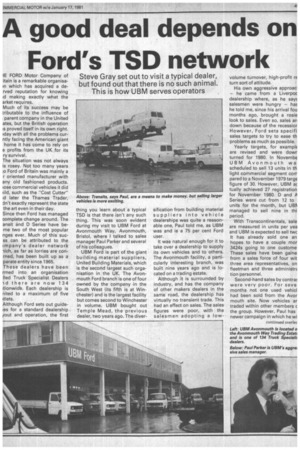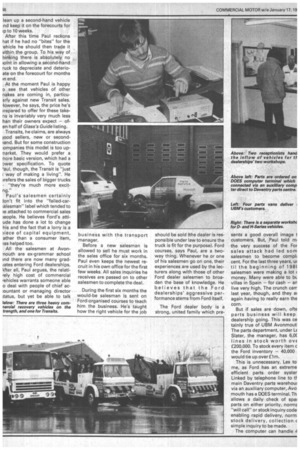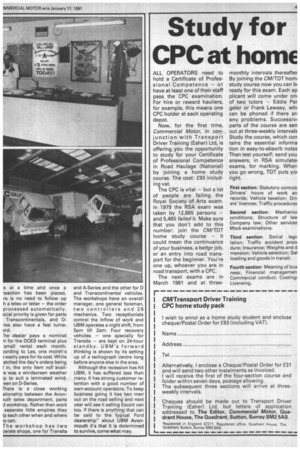A good deal depends on Ford's TSD network
Page 47

Page 48

Page 49

If you've noticed an error in this article please click here to report it so we can fix it.
Steve Gray set out to visit a typical dealer, but found out that there is no such animal. This is how UBM serves operators
1E FORD Motor Company of itain is a remarkable organisain which has acquired a derved reputation for knowing id making exactly what the arket requires.
Much of its success may be tributable to the influence of parent company in the United ates, but the British operation is proved itself in its own right. iday with all the problems curntly facing the American giant home it has come to rely on a profits from the UK for its ry survival.
The situation was not always is rosey. Not too many years lo Ford of Britain was mainly a r oriented manufacturer with any old fashioned products. lose commercial vehicles it did iild, such as the "Cost Cutter" id later the Thames Trader, dn't exactly represent the state the art even in their day.
Since then Ford has managed complete change around. The ansit 6nd D Series have beme two of the most "popular nges ever. Much of this sucss can be attributed to the impany's dealer network iich, as far as lorries are conrned, has been built up as a parate entity since 1965.
These dealers have been rmed into an organisation lied Truck Specialist Dealers id there are now 134 itionwide. Each dealership is nited to a maximum of five it lets.
Although Ford sets out guideles for a standard dealership tout and operation, the first thing you learn about a typical TSD is that there isn't any such thing. This was soon evident during my visit to UBM Ford at Avonmouth Way, Avonmouth, Bristol, where I talked to sales manager Paul Parker and several of his colleagues.
UBM Ford is part of the giant building material suppliers, United Building Materials, which is the second largest such organisation in the UK. The Avonmouth Ford branch is one of four owned by the company in the South West (its fifth is at Winchester) and is the largest facility but comes second to Winchester in volume. UBM bought out Temple Mead, the previous dealer, two years ago. The diver
sification from building material suppliers into vehicle dealerships was quite a reasonable one, Paul told me, as UBM was and is a 75 per cent Ford user.
It was natural enough for it to take over a dealership to supply its own vehicles and to others. The Avonmouth facility, a particularly interesting branch, was built nine years ago and is located on a trading estate.
Although it is surrounded by industry, and has the company of other makers dealers in the same road, the dealership has virtually no transient trade. This had an effect on sales. The sales figures were poor, with the salesmen adopting a low , volume turnover, high-profit re turn sort of attitude.
His own aggressive approac. — he came from a Liverpoc dealership where, as he sayE salesmen were hungry — haE he told me, since his arrival fou months ago, brought a rosie look to sales. Even so, sales an down because of the recessior However, Ford sets specifi sales targets to try to ease th problems as much as possible.
Yearly targets, for examplE are revised and were dowr turned for 1980. In Novembe UBM Avonmouth wa scheduled to sell 13 units in th light commercial segment conr. pared to a November 1979 large figure of 30. However, UBM ac tually achieved 27 registration for November 1980. D and A Series were cut from 12 to units for the month, but UBA managed to sell nine in thi period.
With Transcontinentals, sale are measured in units per yea and UBM is expected to sell twc It has already sold one an hopes to have a couple mor 3424s going to one custome These sales have been gaine from a sales force of four wit three area representatives, on fleetrnan and three administrc tion personnel.
Second-hand sales by contra. were very poor. For save months not one used vehicl had been sold from the Avor mouth site. Now vehicles ar traded within other members c the group. However, Paul has newer campaign in which he wi lean up a second-hand vehicle nd keep it on the forecourts for ip to 10 weeks.
After this time Paul reckons hat if he had no "bites" for the • ehicie he should then trade it vithin the group. To his way of hinking there is absolutely no loint in allowing a second-hand ruck to depreciate and deterioate on the forecourt for months In end.
At the moment Paul is happy
o see that vehicles of other nakes are coming in, particuarly against new Transit sales. iowever, he says, the price he's prepared to offer for these takens is invariably very much less han their owners expect — ofen half of Glass's Guide listing. Transits, he claims, are always load sellers, new or secondland. But for some construction ;ompanies this model is too upnarket. They would prefer a nore basic version, which had a Dwer specification. To quote 'aul, though, the Transit is "just I way of making a living'. He prefers the sales of bigger trucks "they're much more excitng."
Paul's salesmen certainly ion't fit into the "failed-car;alesman" label which tended to Pe attached to commercial sales People. He believes Ford's attiude has done a lot to change his and the fact that a lorry is a Piece of capital equipment, ather than a consumer item, las helped too.
All the salesmen at Avonnouth are ex-grammar school Ind there are now many gradrates entering Ford dealerships. kfter all, Paul argues, the relati(ely high cost of commercial vehicles warrants someone able o deal with people of chief ac:ountant or managing director aatus, but yet be able to talk telow: There are three heavy cornriercial recovery vehicles on the trength, and one for Transits. business with the transport manager.
Before a new salesman is allowed to sell he must work in the sales office for six months. Paul even keeps the newest recruit in his own office for the first few weeks. All sales inquiries he receives are passed on to other salesmen to complete the deal.
During the first six months the would-be salesman is sent on Ford-organised courses to teach him the business. He's taught how the right vehicle for the job should be sold the dealer is responsible under law to ensure the truck is fit for the purpose). Ford courses, says Paul, are a twoway thing. Whenever he or one of his salesmen go on one, their experiences are used by the lecturers along with those of other Ford dealer salesmen to broaden the base of knowledge. He believes that the Ford dealerships' aggressive performance stems from Ford itself.
The Ford dealer body is a strong, united family which pre sents a good overall image 1 customers. But, Paul told mi the very success of the For sales attack had led som salesmen to become compl; cent. For the last three years, w til the beginning of 198( salesmen were making a lot money. Many were able to bt, villas in Spain — for cash — an live very high. The crunch carr last year, though, and they al again having to really earn the corn.
But if sales are down, ofte parts business will keep dealership going. This was ce tainly true of UBM Avonmout The parts department, under LE Slater, the manager, has 6,0C lines in stock worth OVE £200,000. To stock every item e the Ford inventory — 40,000 would tie up over Elm.
This is unnecessary, Les to me, as Ford has an extreme efficient parts order syster Linked by telephone line to t1 main Daventry parts warehow via an auxiliary computer, Avo mouth has a DOES terminal, Th allows a daily check of spa' parts on either priority, normz "will call" or stock inquiry code enabling rapid delivery, norm stock delivery, collection simple inquiry to be made.
The computer can handle 4
Is at a time and once a misaction has been placed, !re is no need to follow up h a telex or letter — the order processed automatically. eciai priority is given for parts Transcontinentals, and Dries also have a fast turnaind.
The dealer pays a nominal .n for the DOES terminal plus small rental each month. cording to Les, one month's 3 easily pays for its cost. While .atched the day's orders being in, the only item not availle was a windscreen weather ip to suit a laminated wind.een on 0-Series.
['here is a close working ationship between the AvonAlth sales department, parts d workshop. Rather than work separate little empires they lp each other when and where )y can.
The workshop has two oarate shops, one for Transits
• and A-Series and the other for D and Transcontinental vehicles. The workshops have an overall manager, one general foreman, two controllers and 26 mechanics. Two receptionists control the inflow of work and UBM operates a night shift, from 5pm till 2am. Four recovery vehicles — one specially for Transits — are kept on 24-hour standby. UBM's forward thinking is shown by its setting up of a tachograph centre long before anyone else in the area.
Although the recession has hit UBM, it has suffered less than many. It has strong customer retention with a good number of own-account operators. To keep business going it has two men out on the road selling and next year will see it selling Escort van too. If there is anything that can be said to the typical Ford dealership" about UBM Avonmouth it's that it is determined to survive, come what may.












































































































